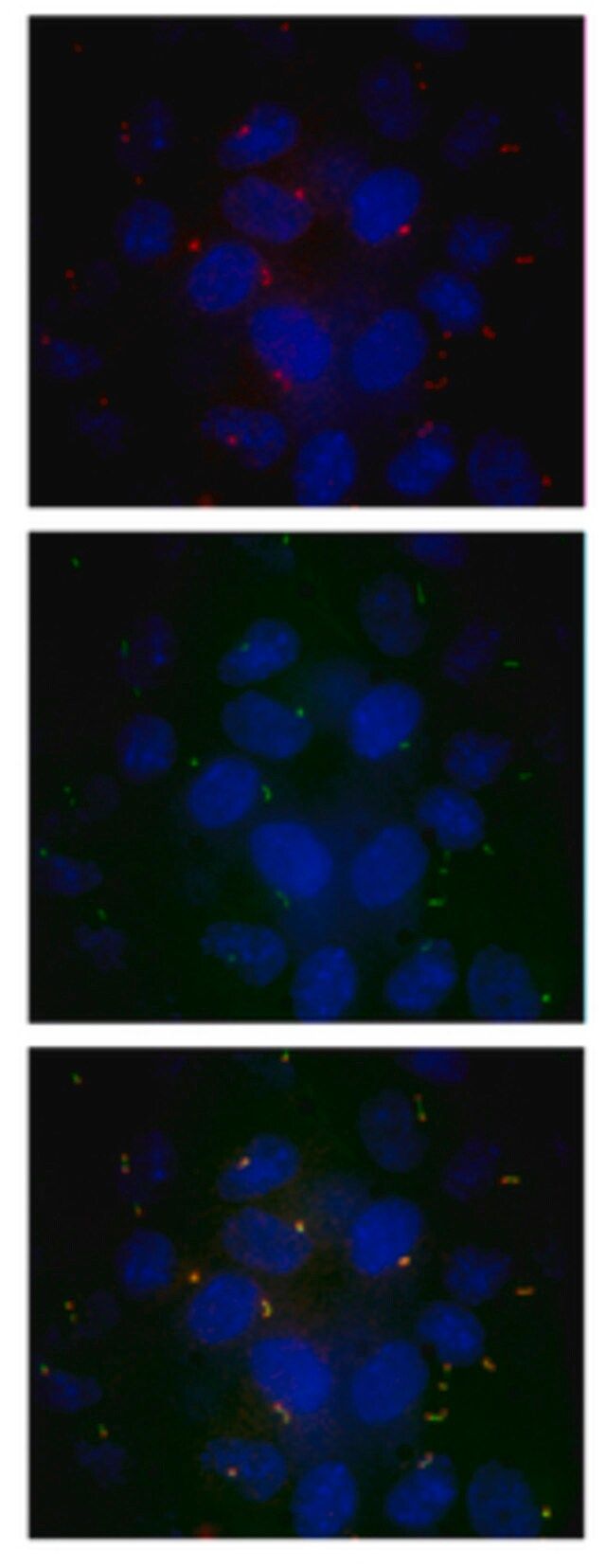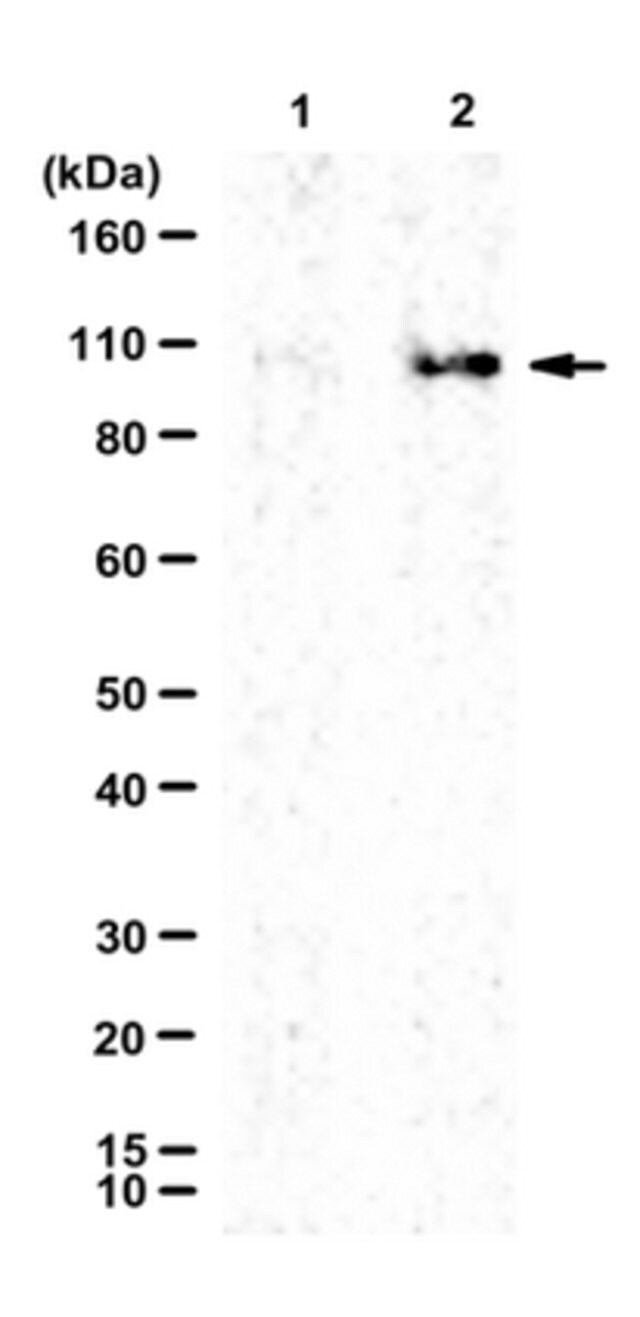您的位置:首页 > 产品中心 > Anti-IFT88 Antibody
产品别名
Anti-IFT88 Antibody
Intraflagellar transport protein 88 homolog, Polaris, Recessive polycystic kidney disease protein Tg737, Tetratricopeptide repeat protein 10, TgN(Imorpk)737Rpw, TPR repeat protein 10
基本信息
| eCl@ss | 32160702 |
| NACRES | NA.41 |
| General description【一般描述】 | Intraflagellar transport protein 88 homolog (UniProt Q61371; also known as Polaris, Recessive polycystic kidney disease protein Tg737, Tetratricopeptide repeat protein 10, TgN(Imorpk)737Rpw, TPR repeat protein 10) is encoded by the Ift88 (also known as Tg737, Tg737Rpw, TgN737Rpw, Ttc10) gene (Gene ID 21821) in murine species. The primary cilium is a microtubule-based mechano- and chemo-sensory organelle that coordinates an array of cellular pathways during development and in tissue homeostasis, including Hedgehog (Hh), PDGFRα and Wnt signaling. Primary cilium is assembled and maintained via a process termed intraflagellar transport (IFT) in mammalian cells during growth arrest. Ift88/Polaris/Tg737 is a subunit of the IFT particle complex B required for the assembly of functional IFT. Defects in primary cilium assembly lead to severe developmental diseases and disorders referred to as ciliopathies. Polycystic kidney disease (PKD) is one of the first diseases identified to be linked to dysfunctional primary cilia. PKD was originally identified in the Oak Ridge Polycystic Kidney (ORPK) mouse harboring mutated Ift88 gene (Ift88orpk or Ift88Tg737NRpw). Ift88/Polaris/Tg737 is commonly used as a primary cilium marker. |
| Specificity【特异性】 | This antiserum stains primary cilia in human, mouse, and rat cells by fluorescent immunohistochemistry and immunocytochemistry. |
| Immunogen【免疫原】 | Linear peptide corresponding to a mouse IFT88 sequence from the region between TPR repeats 3 & 4. Epitope: Region between TPR repeats 3 & 4. |
| Application【应用】 | Immunocytochemistry Analysis: An 1:500 dilution from a representative lot immunostained primary cilia of paraformaldehyde-fixed mouse kidney tubule cells (Courtesy of Dr. Bradley K. Yoder, University of Alabama Birmingham, USA). Western Blotting Analysis: A representative lot detected a greatly reduced Tg737/Polaris expression in lysate from E11.5 mouse embryo limbs with conditional mesenchymal Ift88-knockout (prx1cre;Ift88fl/n) when compared with lysate from a wild-type littermate (Haycraft, C.J., et al. (2007). Development. 134(2):307-316). Immunocytochemistry Analysis: A representative lot detected IFT88 (Tg737/Polaris) cellular localization in paraformaldehyde-fixed rat and murine sperm cells, rat round spermatids, as well as elongating spermatids from Ift88 mutant mice (Kierszenbaum, A.L., et al. (2011). Dev. Dyn. 240(3):723-736). Immunocytochemistry Analysis: A representative lot detected Tg737/Polaris immunoreactivity associated with the cilium of cultured limb bud cells isolated from wild-type mouse E11.5 embryos by fluorescent immunocytochemistry, while cilia were absent in cells from Tg737Δ2–3β-gal embryos (Haycraft, C.J., et al. (2005). PLoS Genet. 1(4):e53). Electron Microscopy Analysis: A representative lot detected IFT88 (Tg737/Polaris) localization in rat round spermatids and fractionated manchettes (Kierszenbaum, A.L., et al. (2011). Dev. Dyn. 240(3):723-736). Immunofluorescence Analysis: A representative lot detected polaris immunoreactivity in both dental epithelium (DE) and dental mesenchyme (DM) of lower molar frontal sections from E13.5 and E16.5 embryonic mice (Ohazama, A., et al. (2009). Development. 136(6):897-903). Immunofluorescence Analysis: A representative lot immunostained primary cilium on epithelial and mesenchymal cells of the skin and hair follicle using OCT-embedded frozen skin sections from both mouse embryos and adult mice (Lehman, J.M., et al. (2009). J. Invest. Dermatol. 129(2):438-448). Immunofluorescence Analysis: A representative lot detected Ift88 (Tg737/Polaris) immunoreactivity enriched at the base and tip of the hair cell (HC) kinocilia in the ciliary axonemes by fluorescent immunohistochemistry using 4% paraformaldehyde-fixed inner ear cochlear whole mounts prepared from mouse E14.5 embryos (Jones, C., et al. (2008). Nat. Genet. 40(1):69-77). Immunofluorescence Analysis: A representative lot immunostained cilium in mesenchymal and ectodermal cells in formaldehye-fixed, OCT-embedded frozen limb bud sections from mouse E11.5 embryos by fluorescent immunohistochemistry. Conditional mesenchymal Ift88-knockout (prx1cre;Ift88fl/n) selectively abolished Tg737/Polaris immunoreactivity in the mesenchyme, but not the ectoderm layer (Haycraft, C.J., et al. (2007). Development. 134(2):307-316). Immunofluorescence Analysis: A representative lot detected Tg737/Polaris immunoreactivity at the base and distal tip of cilium in mesenchymal and ectodermal cells in OCT-embedded frozen limb bud sections from mouse E10.5 embryos by fluorescent immunohistochemistry (Haycraft, C.J., et al. (2005). PLoS Genet. 1(4):e53). Detect IFT88 using this Anti-IFT88 Antibody validated for use in Western Blotting, Immunocytochemistry, Electron Microscopy, Immunofluorescence. Research Category Apoptosis & Cancer Research Sub Category Developmental Signaling |
| Quality【质量】 | Evaluated by Western Blotting in mouse kidney tissue lysate. Western Blotting Analysis: A 1:200 dilution of this antibody detected IFT88 in 50 µg of mouse kidney tissue lysate. |
| Physical form【外形】 | Rabbit polyclonal serum with 0.05% sodium azide. Unpurified |
| Other Notes【其他说明】 | Concentration: Please refer to lot specific datasheet. |
产品性质
| biological source【生物来源】 | rabbit |
| Quality Level【质量水平】 | 100 |
| antibody form【抗体形式】 | serum |
| antibody product type | primary antibodies |
| clone【克隆】 | polyclonal |
| species reactivity | human, mouse, rat |
| species reactivity (predicted by homology) | bovine (based on 100% sequence homology) |
| technique(s) | electron microscopy: suitable immunocytochemistry: suitable immunofluorescence: suitable western blot: suitable |
| NCBI accession no.【NCBI登记号】 | NP_033402 |
| UniProt accession no.【UniProt登记号】 | Q61371 |
| shipped in【运输】 | dry ice |
产品说明
| Target description【目标描述】 | ~95 kDa observed. 92.99 kDa calculated. |
| Storage and Stability【储存及稳定性】 | Stable for 1 year at -20°C from date of receipt. Handling Recommendations: Upon receipt and prior to removing the cap, centrifuge the vial and gently mix the solution. Aliquot into microcentrifuge tubes and store at -20°C. Avoid repeated freeze/thaw cycles, which may damage IgG and affect product performance. |
| Disclaimer【免责声明】 | Unless otherwise stated in our catalog or other company documentation accompanying the product(s), our products are intended for research use only and are not to be used for any other purpose, which includes but is not limited to, unauthorized commercial uses, in vitro diagnostic uses, ex vivo or in vivo therapeutic uses or any type of consumption or application to humans or animals. |
安全信息
| Storage Class Code【储存分类代码】 | 12 - Non Combustible Liquids |
| WGK | WGK 1 |






